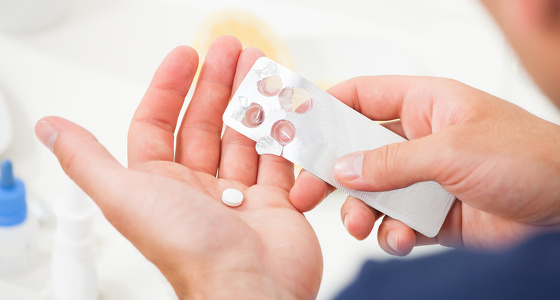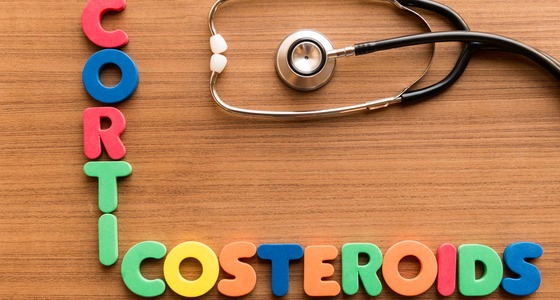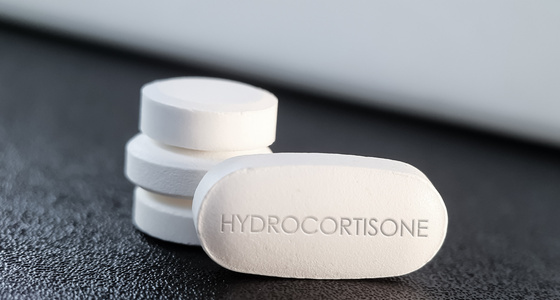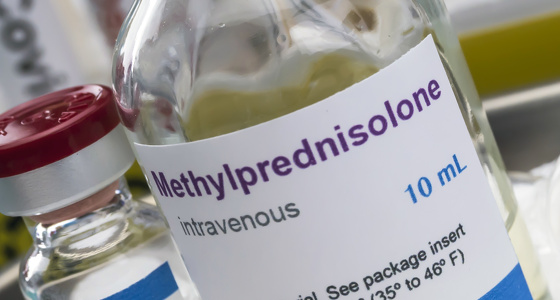Prednisolone is a common steroid prescribed to patients with Crohn's disease and ulcerative colitis. Find out about it in this article...
Prednisolone is one of a group of medicines called corticosteroids, more commonly known as steroids, and is used in the treatment of a wide range of health conditions, including inflammatory bowel diseases such as Crohn’s disease, ulcerative colitis, and microscopic colitis.
Steroids are man-made versions of a hormone called cortisol, which is naturally produced in your body by your adrenal glands. Cortisol has many roles including acting as an anti-inflammatory. It’s also your body’s main stress hormone, and it can change how processes in your body work when you are under stress. This can include your digestive system and your immune system.
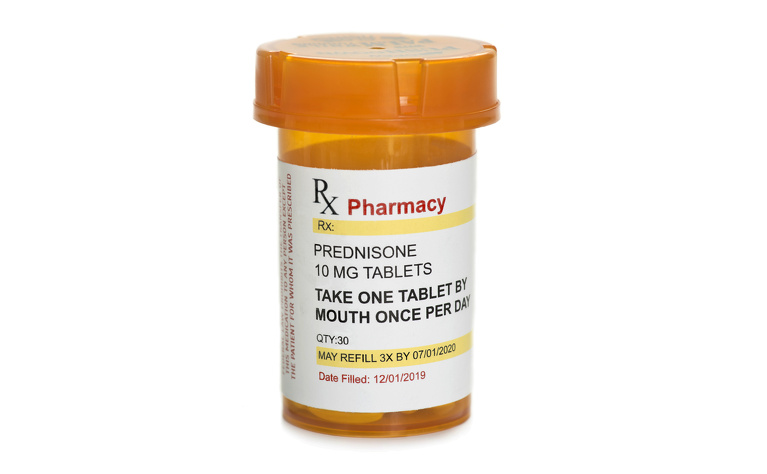
When you take higher doses of steroids than your body would produce on its own, they affect the way your white blood cells work, decreasing the activity of your immune system. This can then reduce inflammation, which is one of your body’s immune responses.
When cells in your body get damaged or infected, they release chemicals that try to protect you from any further damage, or from the infection. These chemicals cause inflammation. Steroids also slow down your body’s production of these chemicals.
You might be prescribed a generic version of prednisolone - it will contain exactly the same active ingredients, and works in the same way as a branded version.
Common brands of Prednisolone are:
When you have IBD, your immune system attacks parts of your digestive tract by mistake, causing inflammation. Prednisolone can quickly help to reduce this inflammation and improve your symptoms.
Oral and topical prednisolone can be used to treat adults and children when they are first diagnosed with Crohn’s disease (or even while they are waiting for a diagnosis), or if they are having a flare.
Oral or rectal prednisolone can be used to treat adults and children with ulcerative colitis when they are having a flare. It can sometimes be used alongside aminosalicylates (5-ASAs) such as mesalazine or sulfasalazine.
Steroids like prednisolone are usually only used for a short time, because they have a high risk of side effects and can damage the body if they are taken for a long time, or several courses of steroids close together. They are an induction treatment, which means they are used to induce remission. Like all steroids, prednisolone will not be used to control your IBD long-term.
Your IBD team will give you detailed information about your dose of prednisolone for your inflammatory bowel disease and how often you should take it. You can also read the patient information leaflet included in every medicine packet.
You will usually take prednisolone tablets, gastro-release (sometimes called enteric coated) tablets and solution once a day, in the morning with breakfast. This means it will be less likely to upset your stomach or affect your sleep.
You can swallow prednisolone tablets with water - you will probably have a few to swallow at a time. Gastro-resist (enteric coated) tablets should always be swallowed whole and not chewed - they are specially coated to stop them dissolving in your stomach, and chewing or breaking them could stop them working properly. You should also avoid taking indigestion medicines for two hours before and two hours after taking gastro-release tablets.
Prednisolone liquid solution can be measured out using a syringe and bottle adapter, in the amount prescribed by your IBD team. You should take it in the morning with or after food.
Oral prednisolone is often prescribed as an eight week course of treatment, and your IBD team may ask you to reduce (taper) your dose gradually towards the end of your treatment. Remember it is important you don’t suddenly stop taking prednisolone, even if you feel better, as this could make you extremely unwell.
Topical treatments work to target the area of inflammation directly, such as inflammation in your rectum and the lower part of your colon (large bowel).
Prednisolone suppositories are small bullet-shaped capsules you insert through your anus into your rectum using your finger. You will usually take one suppository per day.
Prednisolone rectal enemas are inserted into your anus using a special applicator, releasing the medicine into your rectum and colon. Normally you will use one enema once a day.
Steroid rectal foam comes in an aerosol can and is inserted in your anus using a special applicator. This delivers the foam into your rectum and colon. You will usually use rectal foam once or twice a day.
Lots of people feel concerned or embarrassed about taking rectal medicines at first. To help make it easier:
Systemic prednisolone affects your whole body, not just the area that it is needed. Systemic prednisolone includes tablets, gastro-release tablets and liquid solutions. They can be very effective, however because they affect all of your body, they are more likely to cause unwanted side effects.
Topical prednisolone treatments are put onto or into the part of your body where they are needed. Because it is targeted only where it is needed to work, topical prednisolone is less likely to cause unwanted side effects, and less likely to interact with other medicines.
Some topical treatments can be more effective than systemic treatments, for example rectal prednisolone treatments can be more effective in treating inflammation in your lower colon, as they target the inflammation directly.
If you are taking prednisolone for inflammatory bowel disease for more than three weeks, or are taking high doses of prednisolone, you should be given a blue ‘steroid treatment card’ with advice and information about your treatment, for you and any healthcare professionals who treat you. You should carry this with you whilst taking prednisolone, and should always show it to anyone who treats you, including your dentist.
When you take prednisolone, you could begin to feel better within a few days. However, it can take longer for some people to notice an effect. Everyone responds differently to medicines, and some people don’t respond at all. Contact your IBD team if you are concerned that your prednisolone treatment isn’t working for you.
You will need some checks before you start taking prednisolone for Crohn's disease or UC. You IBD team will need to know if:
Often you will be prescribed prednisolone at the same time as other medicines. Prednisolone will be used to control your symptoms and get you well while the other medicine takes effect. Then you will gradually reduce (taper) your dose of prednisolone, allowing the other medicine, called a maintenance treatment, to take over and keep you in remission. These medicines include:
Some medicines can interact with prednisolone, so it is important that you tell your IBD team if you are taking other medicines, including herbal treatments, over the counter medicines and complementary therapies. Interactions can change the way either medicine works, or cause unwanted side effects. They can sometimes be useful, but can also be dangerous. Interactions are much less likely to happen when you are using topical steroids.
Common medicines that interact with prednisolone (and other types of steroid) include:
Your IBD team will only prescribe prednisolone when it is considered necessary, and only the smallest dose needed, for the shortest period of time. Where possible, they will prescribe topical prednisolone instead of systemic prednisolone.
About half of people who take prednisolone will get side effects, and some may be mild and will go away on their own. Some may be more serious and might need treatment, or mean that steroids aren’t right for you. You should tell your IBD team if you have a new symptom or side effect.
Common side effects of prednisolone include:
Prednisolone works by decreasing the activity of your immune system which can make it more likely for you to get infections, or for infections to become more serious. Take sensible precautions such as regular hand washing, and avoiding close contact with people who show signs of infection. Contact your IBD team for advice if you think you have an infection.
Immediate side effects:
It is unusual to have an allergic reaction to prednisolone, however if you develop any of the following symptoms, you should contact your IBD team straight away for urgent advice, or seek emergency medical help:
The thought of side effects can be quite worrying, and coping with side effects can be challenging. However it is important to remember that your IBD team will have thought hard before prescribing your prednisolone treatment, and if your inflammatory bowel disease is left untreated, you could become very unwell.
Your body needs cortisol to function healthily. When you take steroids your body makes less cortisol, or even stops making it altogether. You will gradually reduce (taper) your dose of steroids, to allow your body time to begin producing cortisol naturally again. If you stop taking steroids suddenly, your body may not be able to start producing enough cortisol straight away, causing secondary adrenal insufficiency, affecting your blood pressure and glucose levels.
Steroid dependency can happen because your body can’t tell the difference between natural cortisol and steroid medicines. Taking steroid medicines over time can cause your body to become dependent on those medicines, which can lead to you being unable to stop taking steroids without having a flare. If this happens, your IBD team will speak to you about starting another medicine, such as azathioprine, to help you stop steroid treatment completely.
